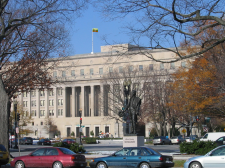United States of Quentin Department of Foreign Affairs
| United States of Quentin Department of Foreign Affairs | |||||
|---|---|---|---|---|---|
| |||||
| Motto: "Assets, Allies, and Diplomacy Abroad" | |||||
| Type: United States of Quentin Executive Department | |||||
| Information | |||||

| |||||
| Headquarters | Jefferson Diversiton Building Mechanicsburg, GA | ||||
| Employees | Around 143,500 (2016) | ||||
| Budget | Ð8.754 billion ($87.54 billion) | ||||
| Executives | Secretary of Foreign Affairs Commissioners Directors | ||||
| Website | cupboard.gov.nwd/dofa[1] | ||||
| History | |||||
| Founded | January 1st, 1835 | ||||
| Current Powers Granted | January 1st, 1849 | ||||
The United States of Quentin Department of Foreign Affairs (QUEDOFA), commonly referred to in the United States of Quentin as the Department of Foreign Affairs, is a Quentinian federal executive department charged with diplomacy, directing foreign policy and keeping the public informed of it, as well as protecting foreign assets, including citizens, businesses, and even foreign trade. All embassies that the USQ runs overseas are directed and commanded by the Department of Foreign Affairs, and the GTNEC of the USQ will routinely take input from the Secretary of Foreign Affairs on treaties and international deals. The Secretary of Foreign Affairs is the head official of the department, and is also an official in the Cupboard, where she advises and takes orders from the President of the USQ.
The current Secretary of Foreign Affairs, Lauren Semmel, was appointed by President Kyle Lovestington on January 1st, 2018, after the previous Secretary Rufus Valeriaun resigned, and was approved by the House of Bureaucrats in early April 2018. The Secretary of Foreign Affairs is currently second in the presidential line of succession, meaning if the President and GTNEC are both unfit to serve, the Secretary of Foreign Affairs will take over.
The Department of Foreign Affairs is headquartered, like many other federal government agencies, in Mechanicsburg, GA, at the Jefferson Diversiton Building, which is located at 759 Cupboard Place, just across the street from 777 Cupboard Place, the residence of the President. The Secretary of Foreign Affairs also resides at 777 Cupboard, however she mainly works and has an office in 759.
History
The idea of executive departments that would all belong to a Cupboard was first imagined and ordered for in the Constitution of the United States of Quentin. In Article III, Section IV, the Constitution calls for different departments that would assist the President in carrying out the law, each with different Secretaries that would advise the President on their respective issues. Though it laid the foundation quite thoroughly, the document did not actually specify as to what the departments should be, or who should create them. One year after the ratification of the document, the House of Bureaucrats decided to take the addition into their own hands, and signed legislation to created the Department of Foreign Affairs, along with the Department of State and the Department of Professions and Labor.
Powers and Responsibilities
The Department of Foreign Affair's responsibilities and powers mainly come from the first Secretary of Foreign Affairs, Jefferson Diversiton's precedence, as well as the definition as laid forth by the House of Bureaucrats in 1835. The main responsibility of the department is stated in the House's definition, laid out in 1835, "There shall be created a Department of Foreign Affairs, to assist the GTNEC in treaty information as well as to control all everyday diplomacy between our peaceful republic and other foreign powers, both hostile and docile." The first charge, which is to give the GTNEC information on treaties has mainly faded, possibly because of the knowledge GTNEC of the USQ Max Wagner had of other nations and their intents, and possibly because the Megaconn and modern media have made it easy to determine the terms of a negotiation or treaty. In any case, though the Secretary of Foreign Affairs and GTNEC do interface and work together often, the role of adviser has been dropped by the Department of Foreign Affairs.
The second charge by the House was to "control all everyday diplomacy," including foreign policy, embassy operations, and negotiations.

